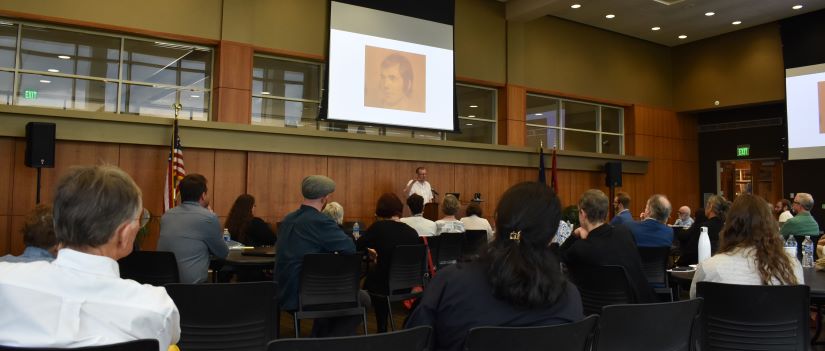The 2024 W. Ormiston Roy lecture was delivered by Dr. Robert Irvine on the topic of “patriot” rhetoric in Burns’ poems, as well as those of his contemporaries. Irvine’s talk was featured during the 13th International Walter Scott Conference, which was hosted by University Libraries in May.
Irvine, a Reader in Scottish Literature at Edinburgh University, discussed Burns as not only a Scottish poet, but a British one as well, as he was widely read in both English and Scottish literature. Focusing on the use of “patriot” rhetoric by poets like Burns and his contemporaries, Irvine described how poetic rhetoric was utilized for “patriotic” values and noted that this rhetoric provides the poet an opportunity to write themselves into the political situation without being part of the cultural elite.
The Roy lecture is given by recipients of the W. Ormiston Roy Memorial Fellowship, established in 1990 by Professor and Mrs. G. Ross Roy in memory of Dr. Roy’s grandfather, W. Ormiston Roy. Dr. Roy began teaching at the University in 1965. In addition to founding the scholarly journal Studies in Scottish Literature, he built one of the world’s most comprehensive and impressive collections on Burns and Scottish Literature. He donated the collection to the University in 1989 and continued to work to bolster the collection by securing even more relevant and important items. In 2002 the University of Edinburgh awarded Dr. Roy an honorary Doctor of Literature for his scholarly contributions to the study of Burns and Scottish literature. When awarded, the Roy fellowship brings a visiting scholar to the University of South Carolina to conduct research in the G. Ross Roy Collection of Burnsiana Literature.
Since its inception, the Roy Fellowship has brought scholars to South Carolina from at least six different Scottish universities, as well as from Canada, Italy, France and elsewhere in the United States. All come to the Irvin Department of Rare Books and Special Collections to do research in the G. Ross Roy Collection of Robert Burns and Scottish Poetry related collections.
“If you look at the list of people who have given the Roy Lecture, it really is a history of the most eminent scholars in Scottish Literature, so it is a great honor to be included in that,” Irvine said.
The University of South Carolina is globally recognized for its expansive collections of and relating to Scottish Literature. According to Irvine, the collection of Robert Burns material specifically is of “global significance.”
“We have an excellent collection of Scottish literature, especially from the Romantic period,” said Dr. Tony Jarrells, Associate Professor of English at the University. “South Carolina was mentioned as a possible host for the conference because of our collection.”
Pieces of that collection are currently on display in an exhibit titled “Scott and Romantic Scotland” brought together mostly by Dr. Patrick Scott, Distinguished Professor Emeritus in the English department, and former director of Rare Books at University Libraries. Scott and Jarrells have both played integral roles in keeping the University’s collection at the forefront of Scottish studies.
Irvine plans to take his time as Fellow to study Burns’ personal collection of books, which would allow him to get a glimpse of Burns’ thoughts on some major historical moments through annotations he might have made.
“Many of his own books are preserved in the Roy collection, so one of the things I want to do is look at them for signs of annotations in his hand, for any clues for how he was responding to them,” Irvine said. “We think of Burns as an icon of Scottishness, but he was very interested in all kinds of literature and keenly aware of the issues at stake in the American Revolution . . . and then the French Revolution too.”
As well as Burns’ personal collection of books, the collection contains manuscripts of poems and letters written to and from Burns, and even books that were written about Burns after he had died. This provides significant insight into the examples of the many other ways people commodified and discussed Burns after his death. Overall, the collection gives a glimpse of not only Burns’ life, but his reactions to the major historical events happening around him, which contextualizes this period.
“I want people to know that the collection is there, and that it is full of fascinating material. Anyone who has an interest in literary history will find lots of new things there if they look,” said Irvine. “I hope the Roy lecture encourages them to do so; and I really look forward to doing so myself.”
“Scott and Romantic Scotland” is on display in the gallery of the Irvin Department of Rare Books and Special Collections and is open to the public. The exhibit will be on display until July 12.
